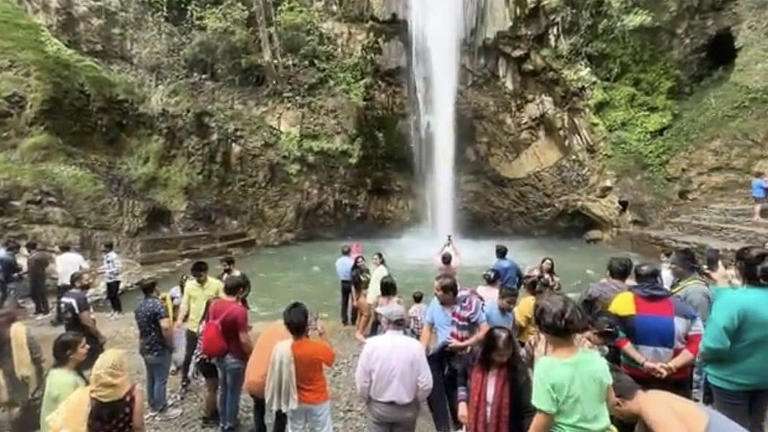A tragic incident at the scenic Tiger Falls in Chakrata, Uttarakhand, has prompted local authorities to impose a temporary ban on bathing and recreational activities at the popular waterfall. The decision comes after two tourists lost their lives on Monday following a sudden surge in water levels, raising concerns over safety measures at the site.
According to officials from the Dehradun district administration, the victims — identified as college students from Delhi — were swept away by a sudden current while bathing near the base of the falls. Despite prompt rescue efforts by the State Disaster Response Force (SDRF), both bodies were recovered only hours later, bringing the excursion to a devastating end.
The district magistrate of Dehradun, Sonika, issued a formal directive on Tuesday suspending all bathing and swimming activities at Tiger Falls until further notice. The directive cites rising water levels due to pre-monsoon showers and increasing footfall during the summer vacation period as major safety risks. Officials have also been directed to put up cautionary signage and deploy personnel to prevent tourists from entering the water.
Tiger Falls, located approximately 98 km from Dehradun and revered as one of the tallest waterfalls in India, attracts hundreds of visitors daily, especially during the summer. The site is nestled in the remote forests near Chakrata, offering a pristine natural setting that has remained largely untouched by commercial tourism. However, the lack of adequate infrastructure and minimal supervision have raised long-standing concerns regarding tourist safety.
Environmentalists and local guides have repeatedly urged the administration to develop a comprehensive safety framework at natural attractions like Tiger Falls. Speaking to the press, environmental activist Neeraj Rawat remarked, “While the natural beauty of the site is undeniable, the increasing number of accidents each year points to a gap in risk management and visitor education.”
This recent accident has once again spotlighted the urgent need for implementing better crowd control, early warning systems, and trained lifeguards at major tourist sites in Uttarakhand. The state, known for its stunning waterfalls, rivers, and trekking routes, sees a high influx of adventure seekers. However, safety measures have not always kept pace with the surge in tourism.
The Tourism Department of Uttarakhand issued a statement expressing condolences to the families of the victims and affirming their commitment to enhancing tourist safety. “We are deeply saddened by this unfortunate event. A joint inspection team will assess all vulnerable sites, and new safety protocols will be enforced to avoid such incidents in the future,” the statement read.
Locals in Chakrata have welcomed the ban as a precautionary measure but have also expressed hope that it will be accompanied by long-term infrastructure development. Several shopkeepers and homestay owners emphasized that while tourism is a major source of income, safety must not be compromised.
Conclusion:
The tragedy at Tiger Falls serves as a grim reminder of nature’s unpredictability and the pressing need for robust safety protocols at tourist hotspots. As Uttarakhand continues to promote eco-tourism and natural exploration, balancing accessibility with adequate safeguards will be crucial. Until then, Tiger Falls will remain off-limits to bathers, with the authorities urging tourists to prioritize caution over curiosity.



